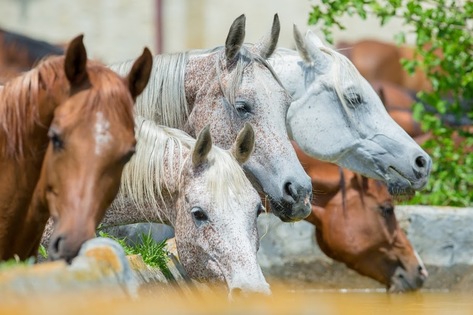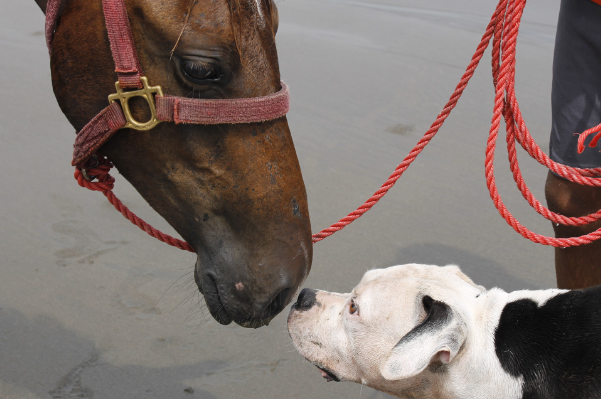
The Most Popular Horse Breeds Of 2019
Equestrian Advice & Guides General Equestrian
Build your business profile for FREE and expose your services to thousands of potential clients!
Create my profile now!
There’s no denying that horses and dogs are incredibly important for us humans. While nowadays they’re often valued for their companionship, these two animals have contributed greatly to our civilization, and maybe even helped us become better people along the way.
Horses and dogs – do they get along? It’s easy to assume so, as these two animals have spent quite a bit of time together throughout the centuries. A well-behaved dog will get along with almost any domestic animal, and a gentle and kind-hearted horse will likely do the same.
Some horses and dogs share a special bond, but it’s important to keep in mind that these are two fundamentally different animals with very different placements in the natural food chain.
In the wild, dogs and wolves are predators, and horses are often their prey. With that in mind, a horse’s natural instinct would be to distrust a dog. With time, a horse can become completely desensitized to domestic dogs, and the two can end up having a wonderful time together.
For us, each of these two animals serves a different purpose, but they can still collaborate to some extent. Today, we’re going to talk about the unique and interesting bond that can form between a horse and a dog, and we’ll start off with the most fun way they interact with each other: playing.
Surely, I’m not the first one to ask this question. In fact, reputable publications such as Behavioural Processes and National Geographic have analyzed the relationship between horses and dogs at length, particularly when it comes to playing and the way the two animals mimic each other’s mannerisms.
The results of their findings even hint at the existence of a universal language of play. When horses and dogs play together, they seem to follow similar behavioral patterns. They jump, nip at each other, and push each other gently. They also roll on their backs and expose their necks and stomachs as a sign of submission and trust.
The reason why dogs and horses can understand each other and play together in the first place is that they can both recognize facial expressions in other animals. Indeed, horses and dogs are some of the most intelligent and socially apt animals that we’ve managed to domesticate. Consequently, they’re able to understand each other to some extent. That’s why they’re able to play together by the same rules.
There are definitely some steps that we can take as horse and dog owners to make sure that these two animals coexist peacefully. However, while training can have an immensely positive effect on both, it’s also important to take breeds into consideration.
Some horse breeds are instinctively more hot-headed than others, and the same thing can be said about dogs. Ideally, you’ll want a well-trained dog that doesn’t have the bad habit of chasing horses around and bothering them.
Also, a cold-blooded draft horse that doesn’t lose its temper too quickly is a much better companion for a dog than a hot-blooded Arabian. The main point is that both animals should enjoy each other’s company or at least not be bothered by each other’s presence. This is an achievable goal, no doubt about it, but it might take some work depending on your particular situation.
In order to build a successful, friendly relationship between a horse and a dog, it’s important to keep stress levels to a minimum.
It’s natural for horses to fear dogs, and for dogs to fear large and imposing horses. They need to build trust and to become accustomed to each other’s presence. If your dog has a tendency to make sudden loud noises and your horse spooks easily, you have your entire work cut out for you.
However, your main ally is and always will be desensitization. Gradually, through controlled exposure, your dog will have diminished responses while being in the presence of horses. If your dog is afraid or anxious when being presented with a horse, it might act in a few different ways:
No matter your dog’s response, it’s important that you remain calm and in control of the situation. If your dog becomes agitated, you should leave the area together and return another time when it has calmed down.
The goal is to get your dog closer and closer to the horse. However, only when the dog manages to remain calm in its presence, you’ll know that you have made significant progress. While performing these exercises, it’s important to have a fence between your horse and your dog.
When it comes to activities involving both horses and dogs, you’re probably thinking of at least two very popular ones: herding and hunting. There’s also another one that I want to talk about, and that’s pleasure riding.
With herding, some dog breeds such as the Border Collie are naturally-born herders. They have an instinct for it, and they enjoy teaming up with humans in order to herd animals such as sheep, cattle, and even horses. On the other hand, horses are incredibly apt when it comes to herding cattle. Not on their own, mind you, but they can prove invaluable while ridden.
Generally speaking, humans usually choose one or the other to help them out when it comes to herding. Both horses and dogs have their own key strengths when it comes to this particular activity. They just don’t team up frequently for it.
Hunting, on the other hand, is a completely different affair. Some dogs are trained specifically to lead a human on horseback to a hunted animal. While not as popular nowadays as they used to be, some forms of hunting rely entirely on being on horseback and having a well-trained hound around.
Last but not least, it’s entirely possible that you might want to enjoy a pleasure riding session while having your dog around. Horseback riding with dogs can be incredibly rewarding for everyone involved, but it does require a bit of preparation beforehand.
First off, you’ll want to make sure that your horse and dog are both comfortable with each other.
The truth is that all animals can be unpredictable. Therefore, in order to avoid any unpleasantries, you’ll want to minimize all risks. If you’re still working upon introducing a dog to your horse, make sure to take baby steps and watch how the two animals react to each others’ presence.
It’s important to remember that, while you’re on horseback, you have little control over your dog since it’s not really recommended to use a leash. Similarly, your horse could do something unpredictable that would put you or your dog at risk.
Mastering basic commands, going on practice runs, and building on the relationship between the two animals can go a long way towards ensuring that your horseback riding sessions are safe and enjoyable even with your dog around.
Horses and dogs are intelligent and social animals. Despite the fact that they don’t naturally get along in the wild, they can overcome their instincts and form tight bonds of friendship.
Under human supervision, they often perform activities together, and they can complement each others’ strengths to some degree. Training and patience are key elements when it comes to introducing a dog to a horse and vice versa, but breeds are often equally important as well.
I hope that this article has helped you gain a better understanding of the unique and interesting relationship between horses and dogs. While dogs are generally regarded as man’s best friend, I’d say horses come in at a close second so it’s all the more important for them to get along.

